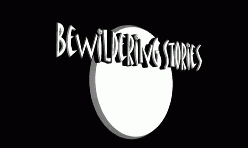Bewildering Stories Editorial
by Jerry Wright
ModernismWhich could be subtitled "Why I thought 'New Wave' SF stunk..."
I've been reading Steven Pinker's The Blank Slate (as you knew if you were over in the book reviews) and what prompted me to actually write a review was Pinker's subsection Hot Buttons and the chapter on "The Arts".The chapter starts out by saying:
The Arts are in trouble. I didn't say it; they did: the critics, scholars and (as we now say) content providers who make their living in the arts and humanities.And then Pinker goes on to show that "art" is not in trouble. There are more paintings, music, stories, and things of an artistic nature being created than ever before. But something IS in trouble... Modernism, and Post-Modernism. This philosophy of modernism was alluded to in a famous statement by Virginia Woolf: "In or about December 1910, human nature changed." What caused her to say that? The event that stood out in Ms. Woolf's mind was a London exhibition of the paintings of the post-impressionists, Cezanne, Gauguin, Picasso, Van Gogh. The movement called "modernism", which in the 1920s was taking over the arts.
All the tricks and techniques that artists had used over the centuries to please the viewer had given way to freakish distortions of shape, color and form. Then dribbles, splashes, and in some cases, blank canvases. Then, apply these "modern" techniques to writing. And from there, to postmodernism. Even MORE agressively relativistic, it insisted that all perspectives have equal value, and there is no such thing as meaning, knowledge, progress, or cultural values. And ALL cultures have equal values.
Now apply that to the writing of SF and what do you get? Aha! The New Wave.
Another comment from Pinker:
It is hard to distinguish oneself as a good artist or discerning connoisseur if people are up to their ears in the stuff, much of it of reasonable artistic merit. The problem for artist is not that popular culture is so bad but that it is so good, at least some of the time. Art could no longer confer prestige by the rarity of excellence of the works themselves, so it had to confer it by the rarity of the powers of appreciation. As Bourdieu points out, only a special elite of initiates could get the point of the new works of art. And with beautiful things spewing out of printing presses and record plants, distinctive works need not be beautiful. Indeeed, they had better not be, because now any schmo could have beautiful things.Postmodernists don't like "linguistic transparency" because it gets in the way of being able to "think the world more radically" and might even allow the text to be understood by the common rabble. This attitude allows them to be regular winners of the annual Bad Writing Contest. The journal Philosophy and Literature which sponsors the contest says, "Deliberate parody cannot be allowed in a field where unintended self parody is so widespread."
So... Anyway, although we like experimental writing (for example, see "Twenty Views of Tanforan"), we still want something that tells a story, something that evokes a feeling, though we hope not a feeling that your four-year-old could have done better. So, now I've had my "AHA" moment, and I feel better about liking what I like.
Copyright © 2005 by Jerry Wright for Bewildering Stories

